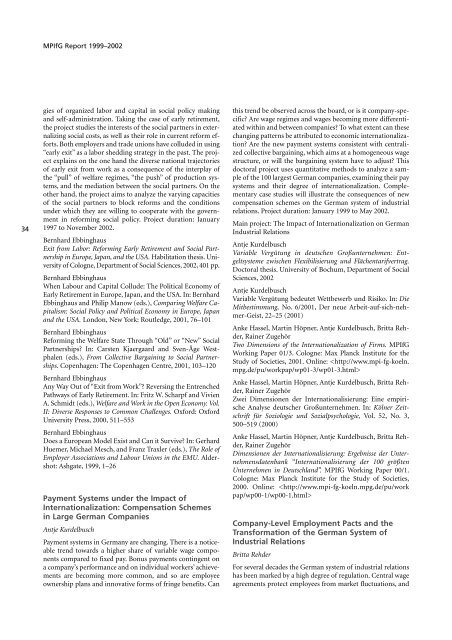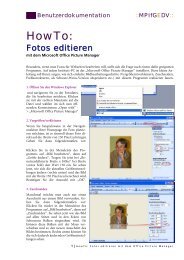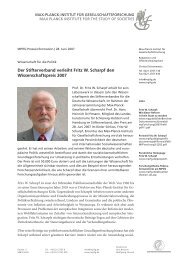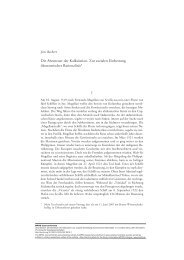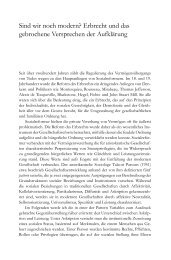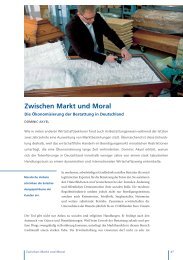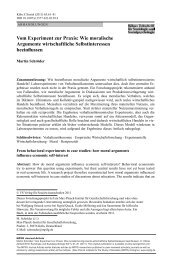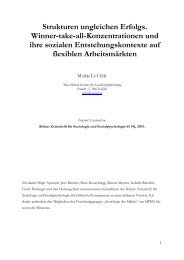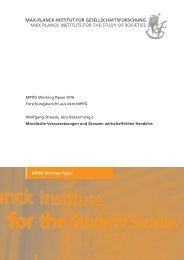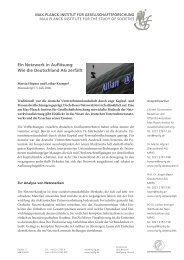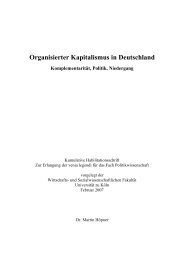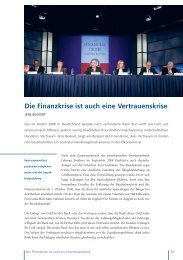Publications - MPIfG
Publications - MPIfG
Publications - MPIfG
Create successful ePaper yourself
Turn your PDF publications into a flip-book with our unique Google optimized e-Paper software.
34<br />
<strong>MPIfG</strong> Report 1999–2002<br />
gies of organized labor and capital in social policy making<br />
and self-administration. Taking the case of early retirement,<br />
the project studies the interests of the social partners in externalizing<br />
social costs, as well as their role in current reform efforts.<br />
Both employers and trade unions have colluded in using<br />
“early exit” as a labor shedding strategy in the past. The project<br />
explains on the one hand the diverse national trajectories<br />
of early exit from work as a consequence of the interplay of<br />
the “pull” of welfare regimes, “the push” of production systems,<br />
and the mediation between the social partners. On the<br />
other hand, the project aims to analyze the varying capacities<br />
of the social partners to block reforms and the conditions<br />
under which they are willing to cooperate with the government<br />
in reforming social policy. Project duration: January<br />
1997 to November 2002.<br />
Bernhard Ebbinghaus<br />
Exit from Labor: Reforming Early Retirement and Social Partnership<br />
in Europe, Japan, and the USA. Habilitation thesis. University<br />
of Cologne, Department of Social Sciences, 2002, 401 pp.<br />
Bernhard Ebbinghaus<br />
When Labour and Capital Collude: The Political Economy of<br />
Early Retirement in Europe, Japan, and the USA. In: Bernhard<br />
Ebbinghaus and Philip Manow (eds.), Comparing Welfare Capitalism:<br />
Social Policy and Political Economy in Europe, Japan<br />
and the USA. London, New York: Routledge, 2001, 76–101<br />
Bernhard Ebbinghaus<br />
Reforming the Welfare State Through “Old” or “New” Social<br />
Partnerships? In: Carsten Kjaergaard and Sven-Åge Westphalen<br />
(eds.), From Collective Bargaining to Social Partnerships.<br />
Copenhagen: The Copenhagen Centre, 2001, 103–120<br />
Bernhard Ebbinghaus<br />
Any Way Out of “Exit from Work”? Reversing the Entrenched<br />
Pathways of Early Retirement. In: Fritz W. Scharpf and Vivien<br />
A. Schmidt (eds.), Welfare and Work in the Open Economy. Vol.<br />
II: Diverse Responses to Common Challenges. Oxford: Oxford<br />
University Press, 2000, 511–553<br />
Bernhard Ebbinghaus<br />
Does a European Model Exist and Can it Survive? In: Gerhard<br />
Huemer, Michael Mesch, and Franz Traxler (eds.), The Role of<br />
Employer Associations and Labour Unions in the EMU. Aldershot:<br />
Ashgate, 1999, 1–26<br />
Payment Systems under the Impact of<br />
Internationalization: Compensation Schemes<br />
in Large German Companies<br />
Antje Kurdelbusch<br />
Payment systems in Germany are changing. There is a noticeable<br />
trend towards a higher share of variable wage components<br />
compared to fixed pay. Bonus payments contingent on<br />
a company’s performance and on individual workers’ achievements<br />
are becoming more common, and so are employee<br />
ownership plans and innovative forms of fringe benefits. Can<br />
this trend be observed across the board, or is it company-specific?<br />
Are wage regimes and wages becoming more differentiated<br />
within and between companies? To what extent can these<br />
changing patterns be attributed to economic internationalization?<br />
Are the new payment systems consistent with centralized<br />
collective bargaining, which aims at a homogeneous wage<br />
structure, or will the bargaining system have to adjust? This<br />
doctoral project uses quantitative methods to analyze a sample<br />
of the 100 largest German companies, examining their pay<br />
systems and their degree of internationalization. Complementary<br />
case studies will illustrate the consequences of new<br />
compensation schemes on the German system of industrial<br />
relations. Project duration: January 1999 to May 2002.<br />
Main project: The Impact of Internationalization on German<br />
Industrial Relations<br />
Antje Kurdelbusch<br />
Variable Vergütung in deutschen Großunternehmen: Entgeltsysteme<br />
zwischen Flexibilisierung und Flächentarifvertrag.<br />
Doctoral thesis. University of Bochum, Department of Social<br />
Sciences, 2002<br />
Antje Kurdelbusch<br />
Variable Vergütung bedeutet Wettbewerb und Risiko. In: Die<br />
Mitbestimmung, No. 6/2001, Der neue Arbeit-auf-sich-nehmer-Geist,<br />
22–25 (2001)<br />
Anke Hassel, Martin Höpner, Antje Kurdelbusch, Britta Rehder,<br />
Rainer Zugehör<br />
Two Dimensions of the Internationalization of Firms. <strong>MPIfG</strong><br />
Working Paper 01/3. Cologne: Max Planck Institute for the<br />
Study of Societies, 2001. Online: <br />
Anke Hassel, Martin Höpner, Antje Kurdelbusch, Britta Rehder,<br />
Rainer Zugehör<br />
Zwei Dimensionen der Internationalisierung: Eine empirische<br />
Analyse deutscher Großunternehmen. In: Kölner Zeitschrift<br />
für Soziologie und Sozialpsychologie, Vol. 52, No. 3,<br />
500–519 (2000)<br />
Anke Hassel, Martin Höpner, Antje Kurdelbusch, Britta Rehder,<br />
Rainer Zugehör<br />
Dimensionen der Internationalisierung: Ergebnisse der Unternehmensdatenbank<br />
“Internationalisierung der 100 größten<br />
Unternehmen in Deutschland”. <strong>MPIfG</strong> Working Paper 00/1.<br />
Cologne: Max Planck Institute for the Study of Societies,<br />
2000. Online: <br />
Company-Level Employment Pacts and the<br />
Transformation of the German System of<br />
Industrial Relations<br />
Britta Rehder<br />
For several decades the German system of industrial relations<br />
has been marked by a high degree of regulation. Central wage<br />
agreements protect employees from market fluctuations, and


